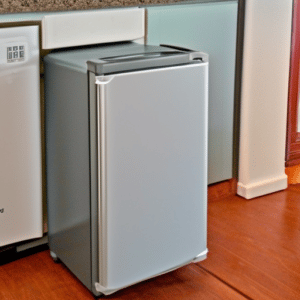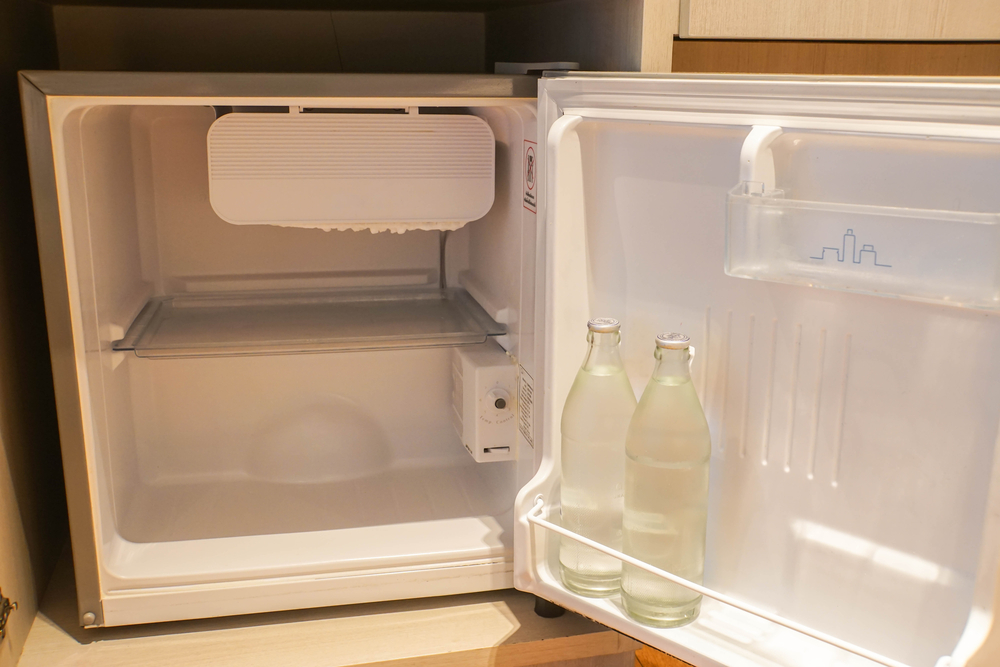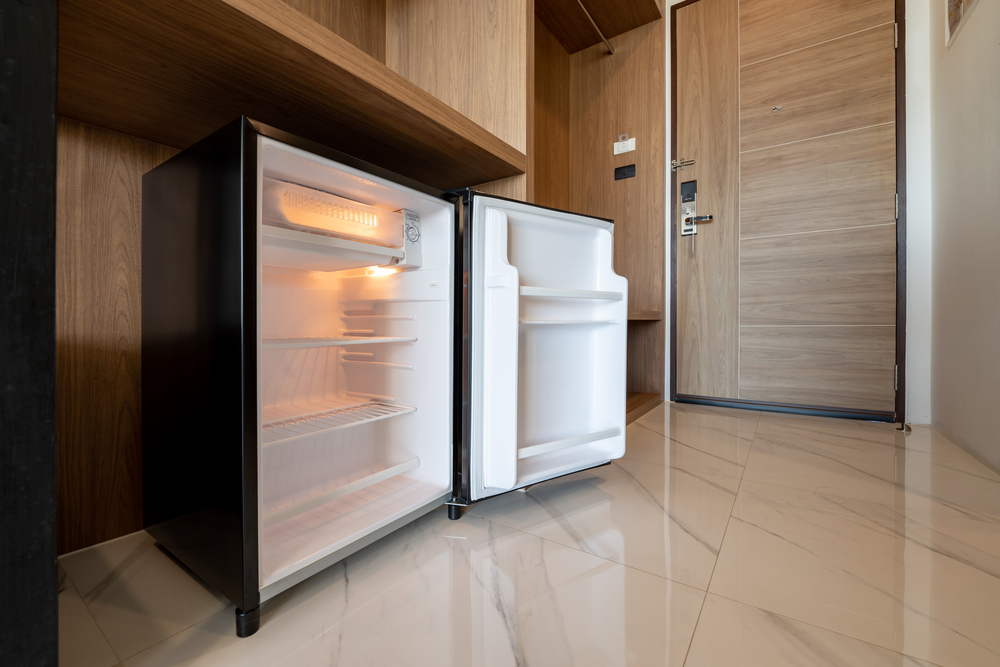As electricity prices go up, understanding a bit more about our appliances’ power consumption can help us determine where we could potentially save money. With rising bills, now is the time to become far more energy-efficient when considering replacing or buying new appliances.
But this is where we encounter a problem. People tend to look at the more significant items in their homes. They look at their main fridge or think about how much it costs to run a tumble dryer. People often overlook items such as compact refrigerators, but some small devices in your home will quickly add up. So, how much electricity does a mini fridge use?
Now, it’s impossible to give you the actual energy consumption for your mini fridge. After all, so many makes and models exist, and they all have different energy star ratings.
So, here is what we are going to do. We will give you some average figures for the average energy consumption of mini fridges. You then need to take these average numbers and convert them, considering your energy bill — you should know how much a single kilowatt-hour costs. We will also address how your mini fridge operates and what that equates to from an energy point of view.
The Average Power Consumption for Mini Fridges
So let’s get the main answer out of the way quickly. After that, we can focus on telling you more about what affects mini fridge power consumption. We eventually want to help you use less energy to cut those kilowatt-hours and save you some money.
As mentioned before, energy consumption varies depending on your mini fridge’s exact make and model, so the best we can do when talking about how energy efficient a mini fridge tends to be is that it gives you an average range of power consumption.
A mini fridge will use anywhere from 55 watts to 85 watts. Compare that to a standard-sized refrigerator, which can consume from 150 watts to 250 watts, and you see the difference.
Those figures are the real averages for the power consumption of a mini fridge. But this is a sliding scale: you can even get two models from the same brand with widely different energy consumption levels.
Is This a Lot?

You cannot simply look at the number of watts and think it’s better because it’s lower. You’ll also have to consider the size of the standard refrigerator when compared to a mini fridge. It makes sense that a standard refrigerator requires more electricity to run just because of its size: to keep more food cool, it needs more air.
But it would help if you also thought about mini fridges from this perspective.
Say you open up your standard refrigerator to take out a cold drink. Your refrigerator must work harder to rebalance the temperature due to the sheer air lost by opening the door. The longer you keep the door open, the greater the energy consumption required to get things back to normal.
Compare this to opening up a mini fridge, and you start to see where mini fridges can make such a difference in energy efficiency.
A mini fridge has a different cooling capacity compared with a standard-sized fridge. This is because people tend to also use these compact appliances purely for cold drinks, so they are opening them less often. That means that a lot less cold air escapes through usage, reducing the amount of electricity they use.
So on the face of it, are mini fridges worth the investment? They surely play a part in your electricity bill, but before we can answer that question precisely. You also need to think about mini fridge wattage, size, cubic foot measurements, etc.
This Makes Them More Energy-Efficient
Simply put, mini fridges use less electricity to chill everything because, unlike standard fridges, the space to keep cool is less, and their smaller door doesn’t let as much cold air escape.
It means they take a fraction of the time to get back to their ideal cooling level once you open their doors: electricity is measured in kilowatt-hours, so you can see how things will start to balance out.
But How Big a Difference Is It?
To understand if a mini fridge is a good investment, we need to look at a few facts and figures to decide how much electricity you save with mini fridges.
Typically, a mini fridge will hold around 1/5th of the inner space compared to a normal refrigerator. If you translate it all into cubic feet of space, things start to max sense from a money point of view. A mini fridge will usually contain approximately 4.5 cubic feet of space versus 18.5 cubic feet of a standard refrigerator, which is a big difference.
If you then work out the average number of kilowatt-hours for both, you’ll see that the operating cost of a standard fridge is almost double that of a mini fridge.
Of course, we know that you can stock a lot more in a standard fridge, but it still shows how little electricity a mini fridge tends to use over a single year.
What Can Affect Your Power Usage?
But here is an important point. We cannot simply look at energy efficiency and state that mini fridges are better than standard-sized ones. Many factors affect how many watts your mini fridge will use on average, and knowing them will surely help you save as much money as possible in the long run. Here are some of the things you need to consider:
The Make and Model
The first thing is the make and model. As with any fridge, you will see that they are given an actual energy rating. You want to ensure your mini fridge comes with an A++ rating instead of a B rating. That means your model is far more energy-efficient.
Their Actual Size
Another thing to look at is the actual size of a mini fridge: the bigger the mini fridge, the greater the energy they consume. Once again, you can look at the cubic feet figure and then work out how much it will consume, given its internal dimensions.
Where You Keep Your Fridge
Some people do not realize that the location of your mini fridge will also play a big part in how much energy it consumes.
The main cause for concern is keeping your fridge somewhere warm. If your fridge is surrounded by hot air, it will make the fridge work harder to chill the air inside. So, suppose you want to reduce how many watts your fridge will use throughout the year. In that case, we highly recommend keeping your fridge away from anything that could produce a higher temperature around it.
How You Use It
Using your compact refrigerator affects the energy power consumption just as it would with full-size refrigerators. If you keep the door open for too long or forget to close it, you’ll see your mini fridge costs soaring, noticing a real difference in your annual electricity consumption.
If you want to use less energy, make sure you open the door for as short a period as possible. Understanding refrigerator energy consumption entails knowing how to use your mini fridge. So, look at fridge use and change your approach to ensure your mini fridge consumes less electricity.
A piece of advice: stop messing around and thinking intently about what to remove from the fridge while the door remains open!
How Old Is Your Mini Fridge?
How much electricity your mini fridge uses also depends on how old your appliance is – that also counts for full-sized refrigerators.
However, if you want to reduce electricity costs, more often than not, getting a new and more energy-efficient appliance might be the best solution.
How They Work Changes Exactly How Much Power They Use
Part of the problem in understanding your annual energy cost is that it’s not an easy task. We cannot just state that a mini fridge adds a set amount of money to your electric bill.
People think it has constant energy usage, but that’s not the case. Electricity consumption varies because a small refrigerator switches on and off at different times throughout the day. How often it comes on depends on the temperature settings and its energy star rating. Add in how many times you open the door to grab your next cold drink, and you start to see how the running cost changes.
What to Check Out to Reduce Operating Costs

So what happens if you wish to reduce the running costs associated with your fridge? Well, we are not talking about the points listed above here. Instead, it has more to do with what to look for in the fridge itself.
First, there’s the energy star rating. Every fridge for sale in the UK has to list its energy star rating, so don’t overlook it. The higher the energy star, the lower the running cost.
Next, you should take into account the level of insulation. A fridge with better insulation will also reduce its running cost. Better insulation means your mini fridge will not consume energy in the same way, thanks to cold air escaping.
A mini fridge loses so much energy through the door: of course, the bigger the cubic foot, the more power it can lose in this way. The more energy it loses through poor insulation, the higher the annual cost to you.
Lastly, you should also check if your mini fridge comes with a freezer. If it does, then it will have a higher energy consumption. It needs to work harder to keep the freezer compartment at its optimal temperature.
Get a Mini Fridge Now!
So, how much electricity does a mini fridge use? You have seen that we can’t give you a precise figure as the answer will depend on factors, mainly the size of your appliance and how you use it—moreover, its make and model and how old the fridge are factors you have to regard.
However, a mini fridge consumes much less energy than a normal refrigerator because of its compact design. Anyway, by following the tips above, you should be able to reduce your electricity usage a bit more than usual.
We have explained why refrigerators use so much electricity, so adding mini refrigerators in your house for extra drinks or specifically for beauty products, along with your main fridge-freezers, will surely raise your bills. But, on the other hand, if you plan on using only a mini fridge as your primary cooling space, you shouldn’t see much increase in your electricity cost!
Are you still worried about a mini fridge wattage to your home bills? We would like to know your thoughts. Type your messages and suggestions below.

